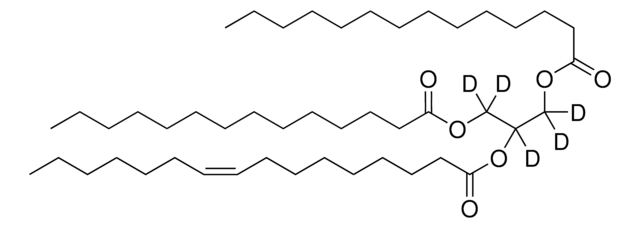860902P
Avanti
16:0-18:0-16:0 D5 TG
Avanti Research™ - A Croda Brand 860902P, powder
Synonym(s):
1,3(d5)-dihexadecanoyl-2-octadecanoyl-glycerol
Sign Into View Organizational & Contract Pricing
All Photos(1)
About This Item
Empirical Formula (Hill Notation):
C53H97D5O6
CAS Number:
Molecular Weight:
840.40
MDL number:
UNSPSC Code:
41116107
NACRES:
NA.25
Recommended Products
form
powder
packaging
pkg of 1 × 1 mg (860902P-1mg)
manufacturer/tradename
Avanti Research™ - A Croda Brand 860902P
shipped in
dry ice
storage temp.
−20°C
SMILES string
[2H]C(C([2H])([2H])OC(CCCCCCCCCCCCCCC)=O)(OC(CCCCCCCCCCCCCCCCC)=O)C([2H])([2H])OC(CCCCCCCCCCCCCCC)=O
InChI key
QRJMBNGGFSPTQP-BXJPYAOGSA-N
General description
16:0-18:0-16:0 D5 TG, also known as 1,3(d5)-dihexadecanoyl-2-octadecanoyl-glycerol, is a prostaglandin deuterated isotope.
Application
16:0-18:0-16:0 D5 TG has been used as an internal standard to quantify triacylglycerol (TG) in the sample by multiple reaction monitoring (MRM) transitions. It has also been used as an internal standard to measure the triglycerol in the experimental sample by ultra-performance liquid chromatography - tandem mass spectrometer (UPLC-MS/MS).
Packaging
5 mL Amber Glass Screw Cap Vial (860902P-1mg)
Legal Information
Avanti Research is a trademark of Avanti Polar Lipids, LLC
Storage Class Code
11 - Combustible Solids
WGK
WGK 3
Choose from one of the most recent versions:
Certificates of Analysis (COA)
Lot/Batch Number
Sorry, we don't have COAs for this product available online at this time.
If you need assistance, please contact Customer Support.
Already Own This Product?
Find documentation for the products that you have recently purchased in the Document Library.
Robin B Chan et al.
PloS one, 12(2), e0172348-e0172348 (2017-02-18)
Parkinson's disease (PD) is a common neurodegenerative disease whose pathological hallmark is the accumulation of intracellular α-synuclein aggregates in Lewy bodies. Lipid metabolism dysregulation may play a significant role in PD pathogenesis; however, large plasma lipidomic studies in PD are
Karolina Tulodziecka et al.
Molecular biology of the cell, 27(22), 3480-3489 (2016-11-05)
Neuronal synapses are the fundamental units of neural signal transduction and must maintain exquisite signal fidelity while also accommodating the plasticity that underlies learning and development. To achieve these goals, the molecular composition and spatial organization of synaptic terminals must
André Miguel Miranda et al.
Translational psychiatry, 9(1), 144-144 (2019-04-28)
Lipids are major constituents of the brain largely implicated in physiological and pathological processes. The hippocampus is a complex brain structure involved in learning, memory and emotional responses, and its functioning is also affected in various disorders. Despite conserved intrinsic
Alessandra Mingione et al.
Cellular physiology and biochemistry : international journal of experimental cellular physiology, biochemistry, and pharmacology, 54(1), 110-125 (2020-01-31)
Cystic Fibrosis (CF) is an inherited disease associated with a variety of mutations affecting the CFTR gene. A deletion of phenylalanine 508 (F508) affects more than 70% of patients and results in unfolded proteins accumulation, originating a proteinopathy responsible for
Qin-Li Wan et al.
Oxidative medicine and cellular longevity, 2019, 5768953-5768953 (2019-06-30)
Aging is a complex life process, and a unified view is that metabolism plays key roles in all biological processes. Here, we determined the lipidomic profile of Caenorhabditis elegans (C. elegans) using ultraperformance liquid chromatography high-resolution mass spectrometry (UPLC-HRMS). Using
Our team of scientists has experience in all areas of research including Life Science, Material Science, Chemical Synthesis, Chromatography, Analytical and many others.
Contact Technical Service








